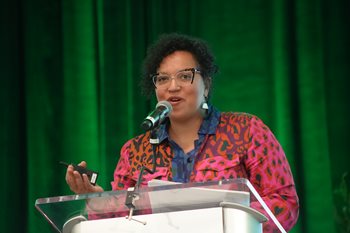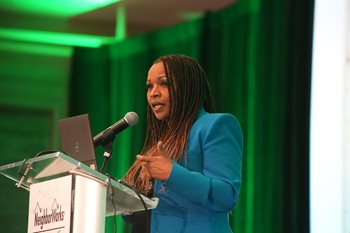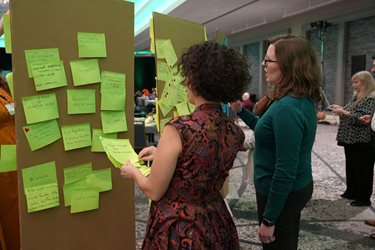Recently, I led NeighborWorks America's symposium, "Co-creating an Equitable Future at the Intersection of Health, Housing and Community Development."
 For this event, my colleagues and I wanted to test out a new format that would help us better understand what the future of the work at this intersection would be like if it was focused on centering the voices of residents – a critical foundation for NeighborWorks America. So we asked ourselves and positioned the question at the heart of the symposium: How do we center the voices of residents so we can also center community transformation?
For this event, my colleagues and I wanted to test out a new format that would help us better understand what the future of the work at this intersection would be like if it was focused on centering the voices of residents – a critical foundation for NeighborWorks America. So we asked ourselves and positioned the question at the heart of the symposium: How do we center the voices of residents so we can also center community transformation?
Over the daylong conversation, symposium participants explored answers for what we, individually and collectively, could do to more powerfully and quickly accelerate creating healthy, thriving communities. One, early conclusion: We must see residents themselves as the drivers of change.
Natalie S. Burke, our keynote speaker and CEO of CommunityHealth ACTION , reinforced this point as she shared the theme "community is the table." Through this lens, she pointed out that our health is not an accident. While some of it is genetic, our health is really determined by the environment in which we live, and that environment is often shaped by forces bigger than our genetics or individual selves.
as she shared the theme "community is the table." Through this lens, she pointed out that our health is not an accident. While some of it is genetic, our health is really determined by the environment in which we live, and that environment is often shaped by forces bigger than our genetics or individual selves.
"Those are the social determinants of health, of which housing is the most important," she said. "You are part of the nation's public health force. You are the lay public health force."
As someone who has been at the intersection of health, housing and community development for the past 15 years, I found that Natalie's poignant and powerful words mirrored my experience in community. It intellectually took me time in my early career to understand that even though I had a graduate degree, I did not have the answers to the health challenges in the community where I started. It was when I finally sourced the history, dreams and hopes of the residents in the community I was working with that I was able to understand my role in partnering with residents to co-create opportunities and better health. If "community is table," our point of view shifts from practitioner to co-partner — and creates the opportunity for change to come. I am glad to have so much good company as we move forward on this path to transforming communities.
We received dozens and dozens of ideas from participants during our time together. In the weeks ahead, I will share more of what we learned. But today, I want to share some of the key takeaways from the symposium, which used "emergent learning," a style of learning that helped us think more deeply and talk more freely about the challenges that lie ahead and how we hope to solve those challenges. As we went through the day, we focused on:
from the symposium, which used "emergent learning," a style of learning that helped us think more deeply and talk more freely about the challenges that lie ahead and how we hope to solve those challenges. As we went through the day, we focused on:
What's happening now.
What we think about what's happening.
What we could do; and what we would do.
At NeighborWorks America, we are celebrating our 45th anniversary and our Healthy Homes and Communities division is celebrating its 10th. As we look back on these past 10 years of innovation, we are also looking toward what's ahead. Centering resident voice and health equity is the new intersection. We recognize it as part of our comprehensive effort to understand the interconnected issues our communities face. The pandemic laid bare disparities and left us this question: How do we raise community voices to accelerate change? As we find different ways to do that, we also recognize that we will only succeed if we are all grounded in community vision. To make real change, residents must be in charge of their own destinies.
Partnerships are always key in the work we do, and we are seeing healthcare investing in housing more often. As we attract health funding, we need to go back to our main roots. Again, that means working alongside residents as we create scalable work. Cocreating with residents is the bridge that we need.
And of course, who is at the center of these partnerships? People. Karen Zuniga, a panelist from ONE Neighborhood Builders, pointed out that it's important to take time to assess our organizations and the way we fill out our staff. "Do the people at your organization look like the people they serve?" she asked. "Do they talk the same language? Eat at the same restaurants? Celebrate the same activities?"
To engage with residents, they have to believe you and believe in you, our participants shared. Some ways to do that? Listen. Show up. Follow through. Trust is not something that can be manufactured; it takes time. As Lisa Richardson of the Institute for Women and Ethnic Studies said, "We have to listen and sit with the things that the people from our neighborhoods bring to us."
Natalie added, "The power of community cannot be overstated when there is trust."
"Do you remember the first time your voice mattered?" That's a question Melissa Jones of Bay Area Regional Health Inequities Initiative asked. It's a question we should all ask ourselves as we continue this work.
During her speech, Natalie shared the famous quote by Greek poet Dinos Christianopoulos, "They tried to bury us. They did not know we were seeds."
Malcolm Yeung of Chinatown CDC added this strong point: "We have to get the soil ready … If the places aren't ready, those seeds aren't going to sprout." That's our next task.
The conversation during the day was raw and honest. Sarida Scott of University of Detroit Mercy recognizes that the work we do is an important part of our ecosystem. "If you think you can have functioning society without this work, you're delusional." At the same time, she said she couldn't do the work she does without being able to envision a positive outcome.
In this business, Sarida shared, "you have to believe that change is possible."
I believe that. I think everyone in the room did as we thought about, urged on by Natalie, the power of the NeighborWorks network and the power of "community is the table." That's why you'll be hearing more on this subject. From all of us.
03/27/2024

